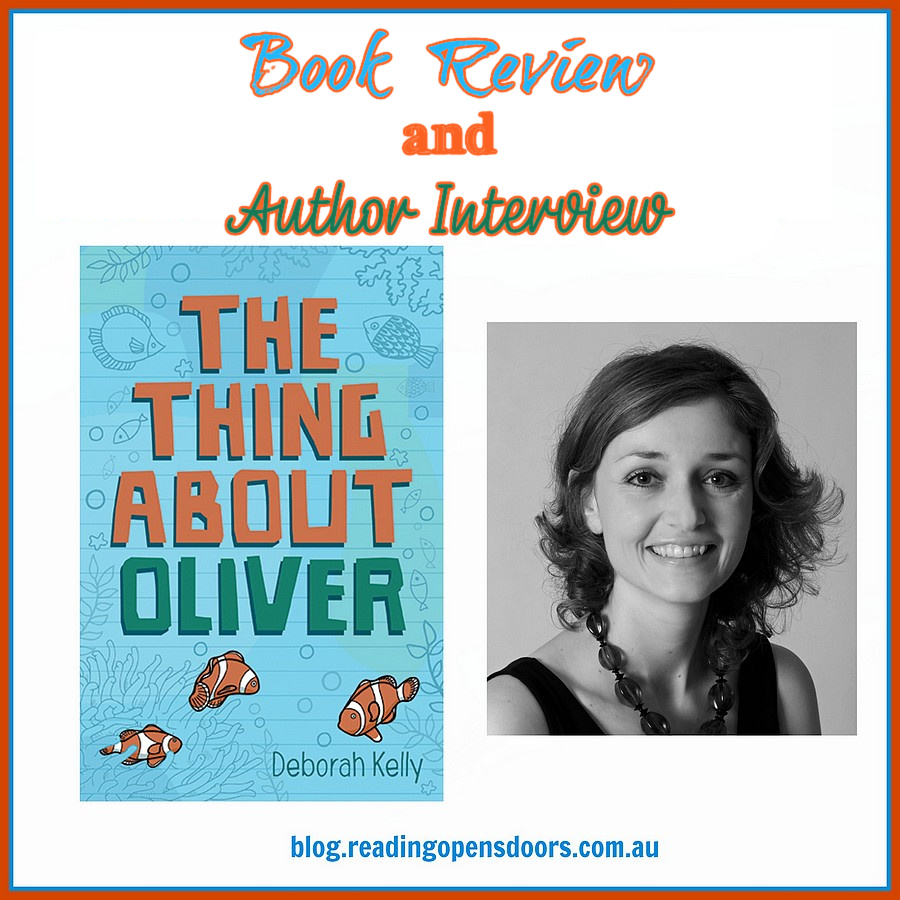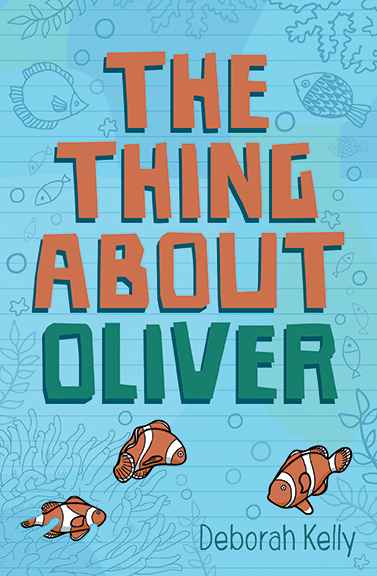
- Title: The Thing About Oliver
- Author: Deborah Kelly
- Publisher: Wombat Books
- Publication date: October 2019
- Suitable age: 8+
- Themes: Family dynamics, difference and diversity, courage, coping with change, fostering empathy, marine life.
- Other notable information: ‘The Thing About Oliver’ has been shortlisted for the 2020 Children’s Book Council of Australia Book of the Year for Younger Readers and the Speech Pathology Australia Book of the Year Awards

‘The Thing about Oliver’ by Deborah Kelly is a profound read that is bound to move you. Oliver has exceptional, special and unique ‘things’ about him – he can hear the rubbish truck long before anyone else can hear it or see it; he finds water mesmerising and he flaps his arms when he is excited. Oliver also has autism. This is a story about one family’s life and what it is like for them living with autism.
‘The Thing about Oliver’ has a focus on Oliver’s twelve year old sister, Tilly and the effect as well as the implications Oliver’s autism has on her and their family. Oliver requires round the clock care and supervision, he is non-verbal and attends speech and occupational therapy weekly. He has episodes where he will shriek for hours at a time until he is exhausted (a slight change in his routine can trigger this, such as him not having soft, cotton sheets; a dog barking, or his mum having a haircut). During these episodes Oliver destroys items in his path and sometimes bites people who are trying to soothe him. Tilly has to keep a lock on her bedroom door to protect her possessions.
At the beginning of the story, Tilly’s mum shoulders the responsibility for caring for Oliver entirely on her own with the exception of Tilly helping her Mum at times. Tilly does this when her mum is catching up on much needed sleep after long nights with Oliver screaming and not settling. Tilly is very adept at calming her brother (with water, his spinner and pieces of paper). Tilly is also passionate about marine life and has a dream to be a marine scientist. The only problem is that this job requires her to swim and Tilly hasn’t been able to have any swimming lessons as her Mum is devoted to Oliver’s care and most of the family’s resources (time and money) are directed to this. Despite this obstacle, Tilly’s passion for sea creatures remains strong; she even keeps a precious journal full of detailed hand drawn illustrations and information about sea life.
Tilly’s Mum loses her job in their country town and this motivates her to seek a new life in Townsville with her sister. What will a change like this mean for their family? Deborah Kelly resolves this story beautifully with love, kindness (from Aunt Janine and the Townsville community) and hope, but it is not without brewing tensions and heartache. This is a story of unbreakable family bonds and the power of love. This is also a story that should be in every home and classroom. There would be a growing number of readers who could identify with the character of Tilly and could benefit from seeing themselves represented in this story. This book also helps to develop empathy and tolerance for people and their families living with autism, or other neurodiverse conditions.
Meet the author, Deborah Kelly

What, or who, inspired you to write a story about a family living with autism and focus on life for the sibling?
I have the privilege of knowing several children on the autism spectrum and their families. There is a lot of support out there for kids on the spectrum now, which is fantastic. But often the siblings of these children are overlooked. They are sometimes called glass children, because it can feel to them as though their overstretched parents look right through them. They have to grow up quickly, are often expected to take on far more responsibility than other kids their age and can feel guilty about their own problems and worries which seem to pale in comparison to those of their sibling. They can also struggle with feelings of resentment and guilt towards their parents and the sibling with special needs.
In The Thing about Oliver I have tried to portray life with an autistic sibling as truthfully and accurately as possible, to give kids like Tilly a voice. But the book is really about Tilly learning to embrace change, something all kids can relate to whether they have an autistic sibling or not.
The Thing about Oliver has been shortlisted for both the Children’s Book Council of Australia Book of the Year Awards (Younger Readers) and also the Speech Pathology Australia Book of the Year Awards. It is my hope that these shortlistings will help to bring the book to the attention of parents, teachers and librarians and into the hands of readers who need it.
When you started writing this story did you have a clear idea about the final part of the story, or did this evolve as you were writing it? Did you have any alternative endings in mind? If so, would you elaborate on these please?
I believe that children’s stories should not shy away from difficult or confronting topics but that they must always offer hope. So it was always my intention that Oliver would be found, and that Tilly should be instrumental in this. The many challenges that the family faced had to help forge stronger bonds between them. While the ending isn’t exactly a ‘happily ever after’, there is a glimpse of a brighter future ahead for all of the family members. In a sense, The Thing about Oliver begins with an ending and ends with a new beginning. There are many challenges, but also plenty of love, humour and hope to be found along the way.
There are so many interesting facts about marine life peppered throughout the book. We appreciated all of this information. What motivated you to make Tilly a character that was passionate about marine life?
I have always been fascinated with the natural world and when I moved to Cairns from New Zealand when I was sixteen, I fell in love with the Great Barrier Reef. I got my marine radio license and SCUBA diving license that year and when I finished school started a marine biology degree at James Cook University in Townsville. I still find nature fascinating and love that kids everywhere seem to share my enthusiasm for interesting facts about all the weird and wacky creatures that inhabit the reef. There is so much to learn, in fact just this week I learned that fish can actually suffer from seasickness- who would have thought?!
Are you working on another book or do you have plans to write another book? If so, are you able to share any details about this?
I always have several projects on the go, at various stages of development. I am currently working on another middle grade novel with themes of friendship and family relationships.
If you were in a position to invite a small group of authors, illustrators or book characters (past or present) to dinner, who would you invite and why?
I often have dinner with other authors and illustrators but I have never had one with book characters!
If I could, my guests might include:
Ruby Wishfingers – she could whip up a fabulous spread so I wouldn’t have to cook.
Peter Pan, because despite being 116 years old, he still refuses to grow up.
The spider from Charlotte’s Web. While I’m not a huge fan of spiders in general, I’ll make an exception in Charlotte’s case. She is a wonderful writer and a loyal, true friend.
Willy Wonka – but only if he promises to bring dessert!
